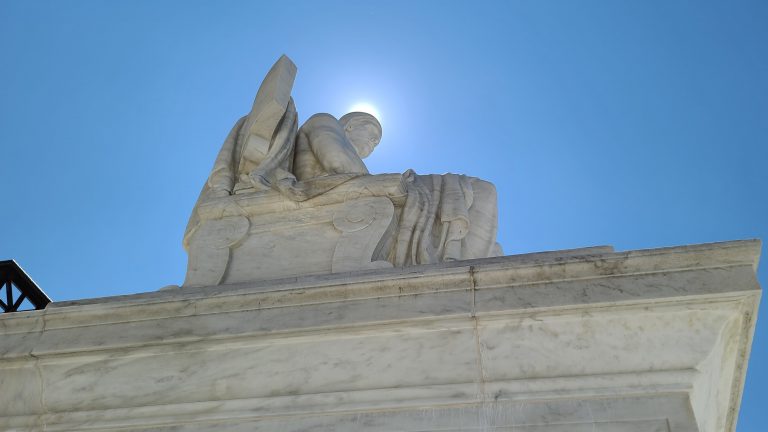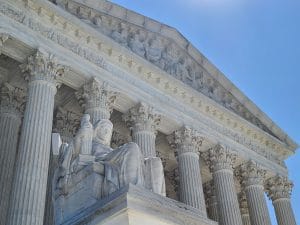The Department of Justice (DOJ) wants the Supreme Court of the United States (SCOTUS) to take up new gun cases.
This week, DOJ filed petitions for the Court to take up two cases. One case, United States v. Daniels, deals with whether a marijuana user can be barred from possessing guns. The other, Garland v. Range, deals with whether somebody who lied on an application for food stamps can.
Federal appeals courts ruled the Second Amendment protected both Patrick Darnell Daniels Jr. and Bryan David Range, invalidating their convictions. The DOJ wants the Supreme Court to reverse those lower court decisions and affirm the federal gun laws they called into question are constitutional.
The Supreme Court often gives the federal government deference in deciding which cases to take up, especially when in cases that would potentially settle a circuit split or resolve a situation where federal law is not being equally applied across the entire country. That’s the situation in both cases making them prime candidates for action by the Court. However, neither may result in a standalone case if the DOJ gets its way.
That’s because the Department requested the Court grant its request to take up the cases but, in both instances, only pending the outcome of the other gun case it has already agreed to hear this term. The DOJ asked the Court to take up United States v. Rahimi earlier this year, and it agreed. That case is not directly connected to either Daniels or Range, but it is tangentially related.
Rahimi wasn’t convicted of possessing a gun under the prohibition on drug users owning guns, like Daniels, or the one on felons, like Range. Instead, he was convicted under a federal prohibition on those subject to domestic violence restraining orders from having firearms. But the three cases all strike at the question of who exactly can be barred from owning guns under the Second Amendment after SCOTUS implemented a new test for gun laws’ constitutionality in 2022’s New York State Rifle and Pistol Association v. Bruen. The answers to those questions will affect millions of gun owners and criminal defendants throughout the country–including President Joe Biden’s son, who is facing federal charges over possessing a gun while being addicted to a controlled substance.
If the Supreme Court takes a broad approach to deciding whether Rahimi can be barred from owning guns under the history and tradition of American firearms regulation, it could answer the key legal questions in all three cases.
In June, a full panel of the Third Circuit Court of Appeals found Range couldn’t be barred from owning guns because there was no Founding Era analogue for disarming people who committed food stamp fraud.
“We agree with Range that, despite his false statement conviction, he remains among ‘the people’ protected by the Second Amendment,” Judge Thomas Hardiman, a George W. Bush appointee, wrote for an 11-4 majority that included two Biden, an Obama, and a Clinton appointee. “And because the Government did not carry its burden of showing that our Nation’s history and tradition of firearm regulation support disarming Range, we will reverse and remand.”
The DOJ criticized the ruling and argued that, while it only applied directly to Range, it “opened the courthouse doors to an untold number of future challenges by other felons based on their own particular offenses, histories, and personal circumstances.”
“The court of appeals’ decision contradicts the historical understanding of the right to keep and bear arms, as well as this Court’s assurances that the Second Amendment does not cast doubt on felon-disarmament laws.” Solicitor General Elizabeth Prelogar wrote. “It also conflicts with recent decisions of the Eighth and Tenth Circuits expressly rejecting felony-by-felony litigation about 18 U.S.C. 922(g)(1)’s constitutionality. And the decision below threatens public safety and poses serious problems of judicial administration by requiring judges to make ad hoc assessments of the risks of allowing convicted criminals to possess guns—a high stakes task that Congress has already determined cannot be performed with sufficient reliability, and one for which the judiciary is particularly ill-suited.”
In August, A three-judge panel for the Fifth Circuit Court of Appeals tossed charges against Daniels. It ruled that Daniels being found with guns and marijuana did not justify the removal of his gun rights because there was no evidence the Founders implemented similar bans.
“In short, our history and tradition may support some limits on an intoxicated person’s right to carry a weapon, but it does not justify disarming a sober citizen based exclusively on his past drug usage,” Judge Jerry E. Smith, a Ronald Reagan appointee, wrote for the unanimous panel in US v. Daniels. “Nor do more generalized traditions of disarming dangerous persons support this restriction on nonviolent drug users. As applied to Daniels, then, § 922(g)(3) violates the Second Amendment.”
DOJ argued the holding was profoundly mistaken. It said the court should overturn it because drug users are not “law-abiding” and inherently incapable of responsible gun ownership.
“The physiological effects of illegal drugs may impair drug users’ ability to handle firearms safely,” Prelogar wrote. “Drug users also often use firearms to commit crimes that fund their drug habit, to engage in violence in the course of drug deals, to endanger police officers who are investigating their drug crimes, and to commit suicide. The Second Amendment allows Congress to disarm persons who are not law-abiding, responsible citizens, and Section 922(g)(3) falls comfortably within that principle.
Oral arguments in Rahimi are scheduled to begin on November 7th, 2023.





